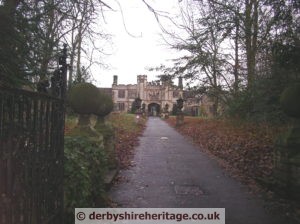Thornbridge Hall was part of the estate of the Longsdon family of Little Longstone from 12th century to 1790 when is was valued at £10,000 and sold to Andrew Morewood a Manchester merchant and partner of Longsdon. The estate included a house of which little is known.
By 1805 the house was built. John Morewood was succeeded by his brother, George, and after his death by his son-in-law James McConnell who in 1859 sold the house back to the Longsdon family and they re-sold the house without much of its original estate to John Sleigh for £10,000.
He stayed until 1871 when he sold it to Frederick Craven when the estate amounted to 185 acres and he rebuilt the house in a Jacobean style. Twenty five years later in 1896 it was sold for £25,000 to George Jobson Marples who increased the estate to over 400 acres and had the house altered.
Marples even built his own railway station in 1903 called Woodlands and had hydraulically operated gates to the estate and gardens. He died in 1929 and the estate was sold for £16,750 to Charles Boot who utilised the house as a home and for business entertainment.
Boot embellished the house and gardens by adding the organ and buffet fountain from Chatsworth, the fireplace from Harlaxton, stone balustrades and other salvaged items from Clumber and various items of statuary from around the world. His business was contracted to demolish Derwent Hall from where he acquired wooden panelling. After Boot died in 1945 the house and 185 acres were sold to Sheffield City Council for £42,500 whence it became a teacher-training college and later a multi-purpose education centre.
Along with 95 acres it was sold again in 1997 when the Hunt family purchased the house from the Council and started restoration work to the gardens, and removed additions to the house to reveal its earlier proportions.
From 2002 Thornbridge Hall has been owned by Jim and Emma Harrison and is both a private family home and a venue for events, including weddings..
The gardens open to the public see website for details.
The original Thornbridge Brewery was based in a converted joiner’s and stonemason’s workshop within the grounds of Thornbridge Hall. It aims “to make a small range of quality cask and bottled beers using new recipes, innovative approaches and the use of local fresh ingredients”. Its first beers appeared in February 2005 and have won awards.

